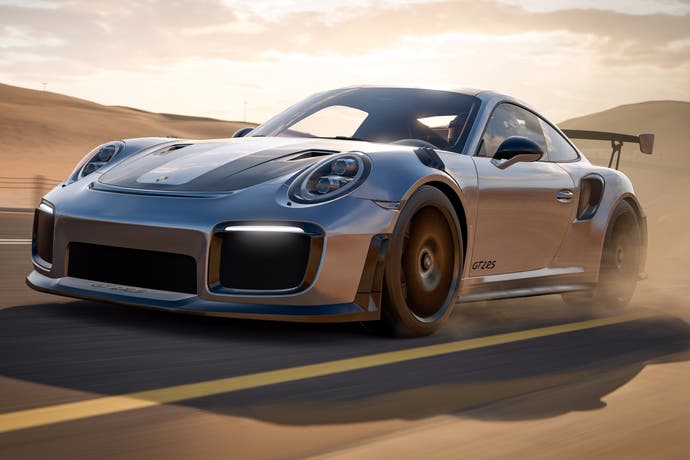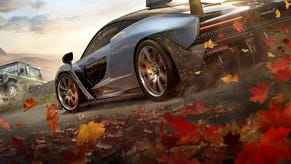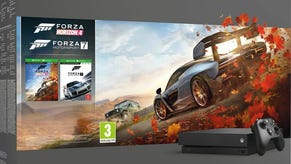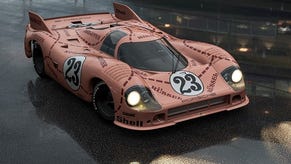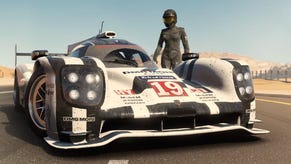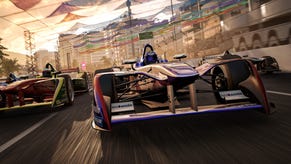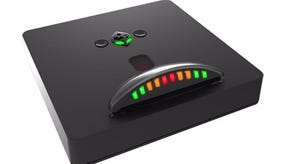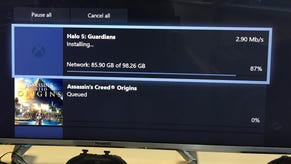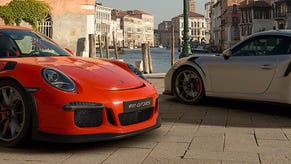Forza Motorsport 7 review
Forza many, not the few.
If you're a regular player of Turn 10's racing games, your first reaction to Forza Motorsport 7 is likely to be: what's new? After a rare stumble with the slender and skittish fifth game, this most consistent of series hit its confident stride again with the highly polished Forza Motorsport 6, and you're forced to wonder what this sequel could really bring to the table. The initial impression is: not much.
Forza 6's most beneficial changes are present and correct. The career mode is once again a thoughtfully curated journey. A series of championships each offer a number of racing divisions to choose from, themed with a fine eye for every corner of motorsport culture and car design - racing trucks, vintage Grand Prix, early hot hatches and so on - plus a few dramatic one-off 'showcase' events as palate cleansers.
It's still a game built from a relatively monotonous grind of one-size-fits-all circuit races, but the showcases do just enough to mix things up, while the racing divisions are consistently varied and enticing. At every stage, you're able to choose from a range of cups that spans classic and modern, motorsport and production, humble and exotic, quick and very quick. This isn't a game where you'll be waiting a long time to try out the most rarefied hardware, but it's also not one to undersell the appeal of chucking a cheap hatchback around a tight corner.
And the car list is breathtaking. It comes with the usual press-release bragging about its sheer size, but its taste and erudition are more remarkable. The Forza series as a whole has really benefitted from the to-and-fro between Motorsport and its younger spinoff series Horizon, not least in how they populate each other's car lists; the latter's appreciation of street-level car culture makes a spicy counterpoint to the former's celebration of motor racing heritage (though importing Horizon 3's heavy-duty off-roaders into this strictly tarmac-bound game is a bizarre choice). Outrageous tuner specials, historic racers and iconic production cars can all be drooled over in the gorgeous Autovista car viewer - and heard, too, in the wonderfully throaty and loud audio. With Gran Turismo narrowing its focus in this year's GT Sport, this is now unquestionably the most authoritative and loving of racing game car catalogues.
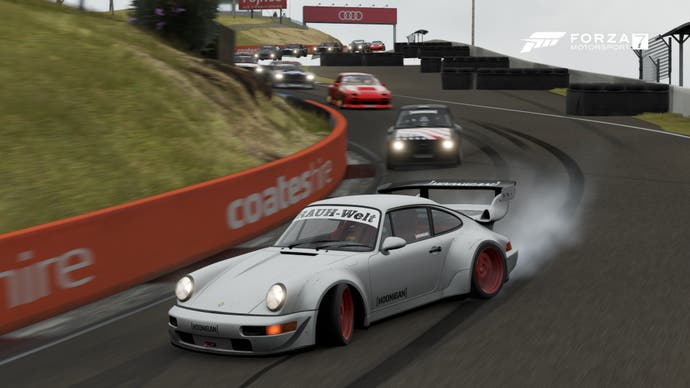
Beyond this, the game's feature set is as expected, and the envy of most rivals. There are 26 track locations; additions include the much-requested returns of Suzuka and series favourite Maple Valley, as well as a glitzy showcase at Dubai and the Virginia International Raceway, a fast, narrow, sinuous ribbon of road that I'd never encountered before. There's a basic two-player split-screen mode (on console only). Rivals, the series' framework for time trial competition, is still best in class, as are the matchmaking, netcode and general seamlessness of online racing. Two important online features are yet to go live - Forzathon calendar events and the excellent competitive racing Leagues from Forza 6 - but when they do, this will be the most complete, accessible, well curated, well structured, well engineered, and frequently updated online racing environment around.
That is not to say that it will be the best environment for fair and clean online racing, though. Leagues only partly solved the tendency of the larger Forza community towards first-corner pileups, sideswiping and highly aggressive contact racing, and these can't be avoided in the rather slim selection of multiplayer 'hoppers' available now. Forza will need to follow GT Sport and Project Cars 2 in copying iRacing's safety rating system if it's ever going to solve this issue. However, if you're phlegmatic enough to shrug the crashes off - or prepared to give as good as you get - then there's a lot of high-octane fun to be had online.
It's fair to say that Forza still doesn't set the best example for driver behaviour in its single-player, where the Drivatar AI is prone to obliviously turning into you during even the most careful passing move. That won't come as a shock to anyone who knows Forza. Nor will the handling model: not the most realistic simulation in racing games, but a very entertaining and physically convincing "simcade" hybrid, with just the right amount of give in the grip and a wealth of feedback delivered through the hands, eyes and ears. As usual, there's a comprehensive set of assists that make the game easy for anyone to enjoy; as usual, even more experienced racers might want to leave the traction control on to tame the tendency towards oversteer.
No-one will be surprised to learn that the game is strikingly good-looking, with immaculate car models, immersive camera shake and evocative weather effects. Nor will anyone really be surprised to learn that Turn 10 is making only halting progress on some of the most requested features. Dynamic weather and track conditions are in, finally, but dynamic time of day is not, so a proper endurance racing experience is still a no-no.
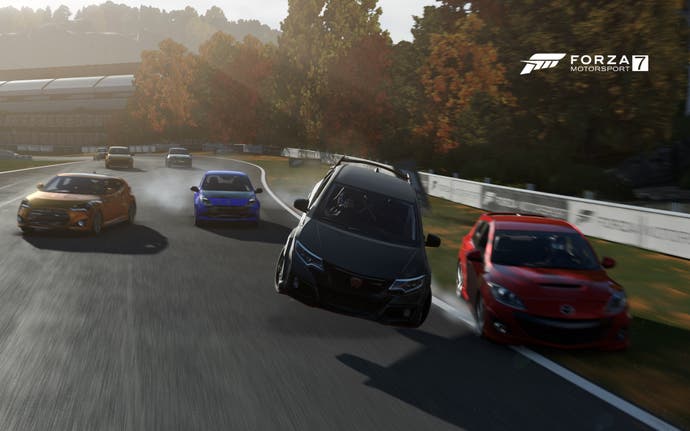
At this point you may be wondering what this review can tell you that my review of Forza 6 didn't. To begin with, so was I. But it turns out that Forza 7 does see some very significant changes - and all of them are going to be controversial.
Let's start with, in my view, some positives. The first is 'homologation', an apparently arcane change to the way car classification works which actually has a profound impact. As in every Forza, you can upgrade any car to your heart's content - turning a Mk 2 Golf GTI into an unfeasible S-class supercar if you like. This time, though, you might not actually be able to use it. To be eligible to compete in career mode - and even in any of the multiplayer hoppers (so far) - your car needs to be homologated, which means it can't exceed the limits of a particular performance class. For the 1992 Golf, that's now the humble D-class, so our S-class hot rod is functionally useless outside of Free Play.
This is such a break with Forza tradition that it has caused consternation, but I think it's a good move. It helps with balancing issues, prevents the domination of particular models within performance classes, and promotes competitive racing in lower classes - which, although many S-class-obsessed players refuse to believe it, can be terrific fun. Also, it makes the action, if not more realistic, more credible; you no longer see the faintly silly spectacle of a classic Mini rocketing to 60mph in three seconds and pinballing off the barriers, and the subtler capabilities of humbler cars are nicely exposed. I think all this is worth the cost - which includes the fact that some cars, which reside near the top of their homologation classes in stock trim, can now barely be usefully upgraded at all.
What's strange is that Turn 10 has focused on homologation to the total exclusion of a playstyle that has been a Forza staple since the beginning, and to which a great many players are attached. I don't see why some old-style performance-class-based multiplayer hoppers couldn't have been included - or why the open cups within the career, which let you pick a car and then shape a championship around it, really needed to follow the homologation requirement.
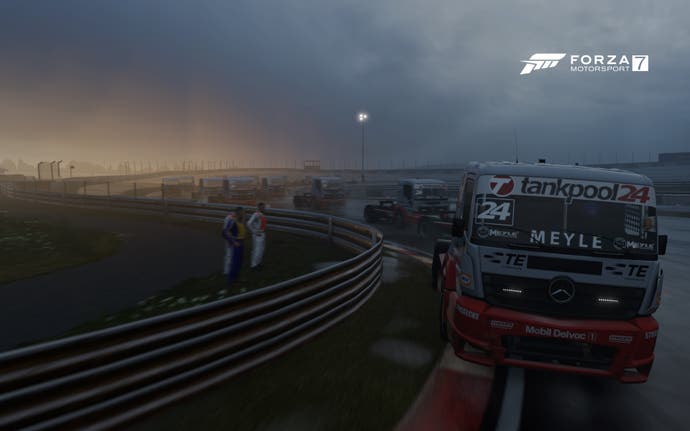
A change I'm more cautiously in favour of is the attempt to give more structure and purpose to building your car collection. The game's car catalogue is now divided into tiers of rarity, and you'll need to expand your garage, accruing the collection score allocated to each car, to unlock later tiers for purchase. Each tier actually encompasses a broad spread of machinery, so it's not like you're stuck in prosaic vehicles at the start, and progress through the tiers is relatively swift. It's yet another progression system in a game overburdened with them (in the course of career mode racing, you earn credits, XP, collection score and series points). But since Forza's revised career path and generous economy have more or less eradicated the old-school 'CarPG' grind up from the lower classes, it brings a welcome bit of motivation and an extra level of desirability to the higher strata of cars.
The car rarity system also plugs into another, less welcome addition in Forza 7: prize crates, or to call them by their true name, loot boxes. Crates cost between 20,000 and 300,000 credits - new car money - and may contain cars, badges for your gamertag, racing suits for your avatar, and mods. (More on mods in a moment.) Many cars can't be bought, but need to be earned as rewards - sometimes from time-limited events - or found in crates. It's not clear if some cars are only available from the crates. I doubt it, but the inducement to buy crates for the slot-machine hit of finding the car you want for your collection is clearly present regardless.
The badges and driver skins are harmless, cosmetic, collectable fluff. If rare cars are the lure for prize crates, mods are the hook they hope to sink into you. These limited-use cards apply conditions to a race in return for a credit or XP reward, and have been fleshed out from their rather pointless implementation in Forza 6. Some mod conditions are a fun challenge - for example, completing a number of perfect corners or clean passes. Controversially, though, the only way to get an improved reward for increasing the difficulty of your race by turning off assists - which used to be automatic - is now via mods. And the only way to get mods is from crates.
Prize crates aren't cheap, so you have to spend credits to make credits using mods. This feels like a rather solipsistic activity. Presumably it pays off in the long run, but shouldn't you be thinking about racing instead? And why spend car money on a crate that might contain a car when you could just buy a car instead? Next to a clear-cut loot box system with purely cosmetic rewards like, say, Overwatch's, Forza 7's prize crates and mods seem overdeveloped. It's hard to tell if their implementation is Machiavellian or inept - or both.
We're missing a vital piece of the puzzle here, and that's microtransactions. Forza 7's marketplace isn't open yet. Turn 10 confirmed to Ars Technica that it would make a separate currency available for sale: "Once we confirm that the game economy is balanced and fun for our players out in the wild, we plan to offer Tokens as a matter of player choice... There will also be an option within the in-game menu to turn off Tokens entirely." It's surely a given that you'll be able to buy prize crates with tokens.
Taking into account the unwelcome and poorly communicated changes to VIP membership - which again seem to steer the player towards loot boxes - Forza Motorsport 7's mods and prize crates leave a sour taste, and risk a hostile reaction from an audience that was left wary by Forza 5's outrageous microtransactions four years ago. It is not that they break the game; the economy seems perfectly well balanced without mods equipped, and provided you can live without badges and driver gear, you never really need to buy a prize crate. It's that they're so unnecessary and so intrusive. Loot boxes don't have to be evil; they can even be fun in their own right. But you need to draw a clear and inviolable line between them and your core gameplay, and Forza 7, intentionally or not, fails to do that.
How much you will enjoy Forza 7 may well rest on your ability and willingness to tune out the systemic noise created by the mods and prize crates. I can look past them easily enough, which is why I'm recommending what is, in every other respect, a dazzling, expansive and engaging driving game.
I've discussed the internal changes since Forza Motorsport 6, but there are a couple of external ones worth considering, too. The first is that Gran Turismo Sport has abandoned the racing game centre ground that series invented: mass-market semi-simulators and collect-'em-ups that share an indulgent passion for cars with their players. That mantle is now inherited by the Forza Motorsport series, and 7 wears it well.
The second is that Forza Horizon 3 happened. Playground's spin-off series of open-world racers has always been superb, but 3 really struck a chord with players and Microsoft is delighted with its sales. Arguably, Horizon has now become the lead Forza series, and Forza 7 is clearly inspired by its open-hearted generosity, its accessibility, its willingness to entertain. It doesn't quite hit those heights - and it's sad that this jubilant mood is tainted with a hint of muddled avarice. But you shouldn't let that distract you from what is, regardless, the most fun Forza Motorsport yet.
